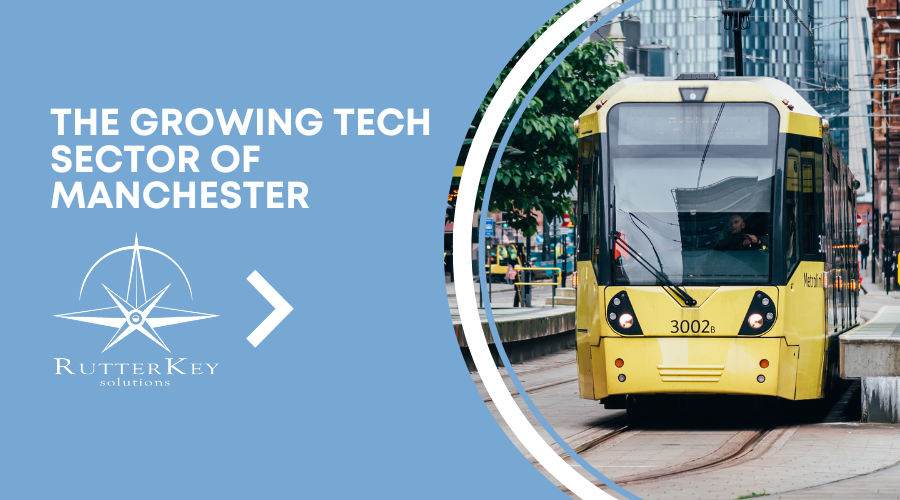
The Growing Tech Sector of Manchester, Home of RutterKey Solutions in the UK
Manchester, the home of the Industrial Revolution, is now a hub for technological innovation. With world-renowned universities and a thriving start-up scene, Manchester is one of the UK’s top cities for tech. In this article, we’ll explore Manchester’s growing tech sector, touching on some of the reasons behind its success, and highlighting the key players driving its growth.
Overview of Manchester’s tech sector
Manchester's tech sector has experienced rapid growth since the explosion of advanced technologies in use for everyday life, becoming the UK's second-largest tech hub and one of Europe's most exciting technology ecosystems.
Manchester is home to a diverse range of companies in the sector, ranging from established global giants to innovative start-ups working in all sorts of sectors, with a thriving community of coders, developers, and entrepreneurs bolstering this growth.
With access to top talent, world-leading universities, competitive business/living costs when compared to London, and impressive digital infrastructure, Manchester is well-positioned to become a major global tech hub.
Reasons behind the growth of the tech sector in Manchester
Below we explore some of the most critical reasons why and how Manchester has grown to be the tech hub it is today.
Early days of technology in Manchester
In the early days of technology in Manchester, the city played a significant role in the Industrial Revolution with its textile mills and factories providing much of the technology used across the country.
The city can also claim the prize for being home to the world’s first railway station, the Manchester Liverpool Road station, which opened in 1830 and revolutionized transportation for the North West of England.
Notable inventions from the city include the first electromechanical computer, the Small-Scale Experimental Machine, which was developed at the University of Manchester in 1948.
Growth of the tech sector following the tech boom
The tech sector in Manchester has experienced tremendous growth following the boom of the early 2000s, resulting in the city becoming a major hub for technology-based businesses.
Notable names Manchester has attracted include large tech companies such as Amazon and Google, which has further contributed to the growth of the technology sector.
The city has also seen an influx of start-ups and entrepreneurs, attracted by the rising popularity of Manchester as a pivotal city to work and live in.
Impact of the Tech Sector on Manchester
Below we outline some of the most prevalent impacts that the tech sector has had on the city.
Increased job opportunities
The tech sector in Manchester has made a significant (positive) impact on the local job market, with the emergence of many new companies and start-ups providing more diverse and rewarding career opportunities, including a wide range of disciplines such as software engineering, data science, and UX design.
The tech sector has also attracted many highly skilled individuals to the city from elsewhere, creating a diverse and vibrant workforce and helping to further contribute to the economic prosperity of Greater Manchester and the North West as a whole.
Improved economy
Manchester's tech sector has had an enormous impact on the city's economy, with new jobs and investments creating a positive ripple effect throughout the city.
This includes rises in wages and increased consumer spending, creating more economic opportunities for local businesses.
Growing start-up culture
Manchester has become a hotspot for tech start-ups. Tech companies in the city raised £532 million in funding in 2022, which is the highest amount outside London and the South East. Manchester retained first place in terms of the best-funded northern technology hub.
This is due to the city's businesses and institutions providing the perfect environment to launch and nurture new businesses. With an increasingly supportive ecosystem of investors, accelerators, incubators, and coworking spaces, tech start-ups in Manchester are thriving.
Manchester Digital
Manchester Digital is a leading digital industry network covering the North West. It supports over 1,000 members in the Greater Manchester region, providing them with resources, knowledge, and connections to help them succeed in the digital economy.
RutterKey Solutions is a proud member of the organization that focuses on creating a vibrant tech and digital industry in the region. It provides a wide range of services including events, training, mentoring, networking, and research.
It works with academia, industry, government, and local authorities to ensure the region remains competitive and successful in the digital economy. It also works with other organizations to promote digital skills, digital businesses, and digital innovation in the region.
Find out more about our current vacancies advertised on Manchester Digital’s website here.
Summary of thoughts
The tech sector in Manchester has grown significantly over the past decade, with the city now home to hundreds of tech companies and start-ups. Some estimate the city to have more than 10,000 digital and tech businesses.
The city has become a hub for digital innovation and is now recognized as one of Europe's leading tech hubs.
This growth has been supported by the city's universities, which have produced a large number of tech-savvy graduates, and the government's investment in the local infrastructure, which has helped to attract tech companies from around the world.
Outlook for the future
The tech sector in Manchester is expected to continue to grow, with new startups and established companies investing in the city and creating an innovative and vibrant tech hub.
Manchester has already established strong connections with global tech giants, allowing for further collaboration and the development of cutting-edge technologies.
The city is well-positioned to become a leader in the tech industry, with a highly educated and skilled workforce, a powerful digital infrastructure, and a commitment to supporting the growth of the sector.









